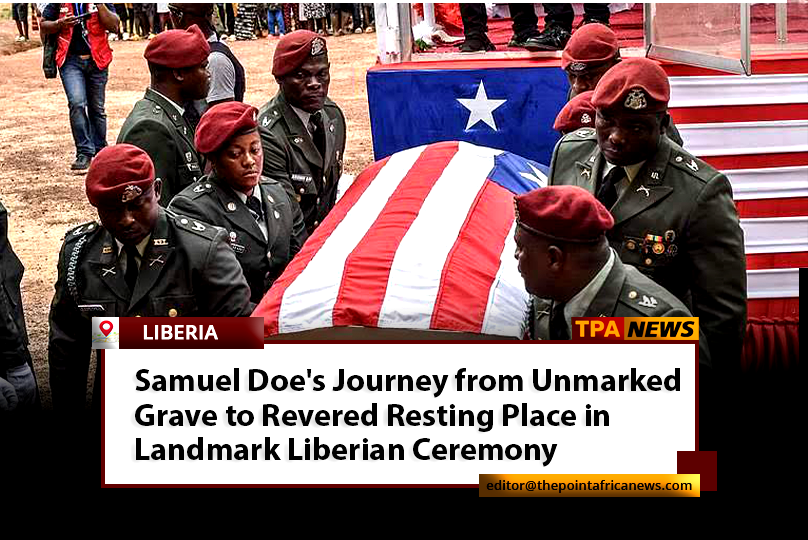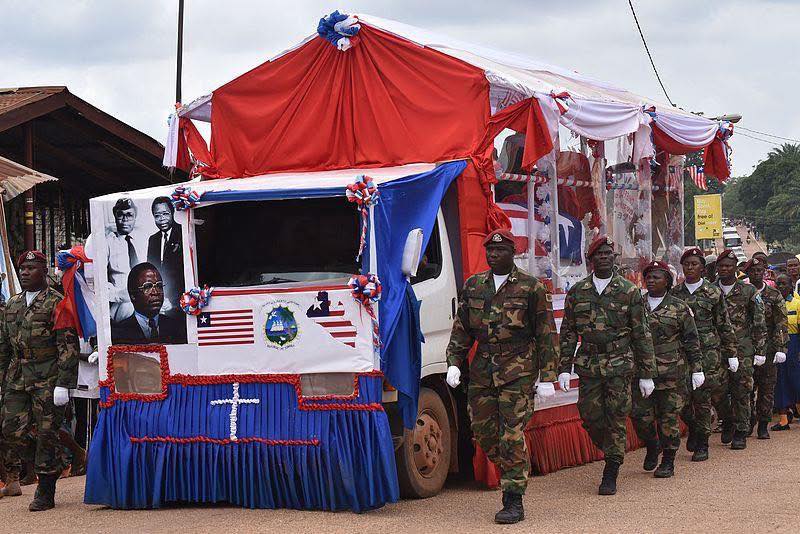
In a day heavy with history and emotion, former President Samuel Kanyon Doe, a figure whose very name evokes the start of Liberia’s darkest chapter, was finally laid to rest today in his ancestral home of Zwedru. President Joseph Boakai, spearheading a national period of mourning, presided over the state funeral, an unprecedented act of reconciliation for a nation still navigating the deep scars of a civil war ignited by Doe’s brutal overthrow and death 35 years ago. His late wife, former First Lady Nancy B. Doe, was buried alongside him, her recent passing providing the immediate impetus for this long-delayed final journey.
The scene in Zwedru was a powerful tableau of remembrance and a stark reminder of Liberia’s tumultuous trajectory. A draped casket, symbolic given the long-debated fate of Doe’s exact remains, joined that of his wife as they were slowly paraded through the flag-draped streets on a military truck. Soldiers of the Armed Forces of Liberia, inheritors of an institution Doe once led, provided a somber escort, completing a circle of history for a man who rose from master sergeant to head of state in a dramatic, bloody coup.
Samuel K. Doe burst onto the Liberian political scene on April 12, 1980, when, as a young, low-ranking officer, he led a coup that overthrew and assassinated President William R. Tolbert Jr. and summarily executed 13 of his cabinet ministers on a Monrovia beach. This event ended over a century of Americo-Liberian dominance and ushered in a new era led by an indigenous Liberian. His rule, initially hailed by many as a break from the past, quickly devolved into an authoritarian regime marked by alleged corruption, human rights abuses, and increasing favoritism towards his Krahn ethnic group. A widely disputed and reportedly fraudulent election in 1985 solidified his grip on power but further alienated a populace yearning for genuine democracy.
The seeds of the devastating civil war were sown during Doe’s repressive rule. By late 1989, a rebellion, primarily led by Charles Taylor’s National Patriotic Front of Liberia (NPFL), erupted, escalating quickly into a full-blown conflict. In September 1990, Doe was captured by a breakaway faction, the Independent National Patriotic Front of Liberia (INPFL), led by Prince Y. Johnson. His torture and murder, infamously captured on video with Johnson sipping beer nearby, sent shockwaves across the globe and plunged Liberia into a brutal, prolonged civil war that claimed an estimated 250,000 lives and ravaged the country’s social and economic fabric for over a decade.
President Boakai, who himself served as Minister of Agriculture under Doe, framed the reburial as a crucial step towards national healing. “Today, we gather not to reopen old wounds in anger, but to bind them with the threads of forgiveness and national unity,” President Boakai passionately declared. His administration has consistently underscored that the dignified reburial of past leaders, including Tolbert, is essential to provide closure and foster a collective national identity free from the ghosts of conflict.
By: TPA News Desk | editor@thepointafricanews.com








Leave a Reply